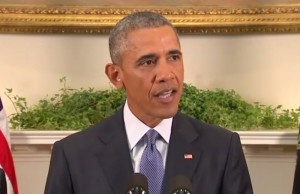
WHITE HOUSE—For an American president who came into office with a promise to end U.S. wars in Iraq and Afghanistan, the announcement to slow the withdrawal of troops from Afghanistan was likely not an easy one.
“I do not support the idea of endless war,” President Barack Obama said. “I repeatedly argued against marching into open-ended military conflicts that do serve our core security interests.”
Flanked by Defense Secretary Ash Carter, Vice President Joe Biden and the Joint Chiefs of Staff Chairman Joseph Dunford, Obama announced Thursday he will maintain the current number of American troops in Afghanistan at 9,800 through most of 2016, before trimming that number to 5,500 by the time he leaves office in January 2017.
Afghan President Ashraf Ghani welcomed the decision Thursday, saying in a statement that it followed “several months of continued talks between the two Presidents.”
Ghani added that the decision “once again shows renewal of the partnership and strengthening of relations of the United States with Afghanistan on the basis of common interests and risks.”
“The combat mission has ended,” Carter explained. “The mission now on a day-to-day basis is train, advise and assist and counter terrorism.”
Carter said the U.S. is intent on fostering stability in Afghanistan over the long term and will not give up gains that U.S. forces have fought so hard to achieve in that country. He said America’s national security remains very much at stake in Afghanistan.
The U.S. troops in Afghanistan will be stationed at a small number of bases, including Bagram, Kandahar in the south, and Jalalabad in the east.
The administration had originally planned to keep only about 1,000 U.S. forces post-2016, with a focus on protecting the U.S. Embassy in Kabul.
Kunduz is gamechanger
“I think what happened in Kunduz is instructive. You had a situation where Afghan troops retook the city of Kunduz from the Taliban, but only with the assistance of US forces,” analyst Michael Kugelman told VOA. “I don’t think there would have been a happy ending in this takeover or this retaking of Kunduz if it weren’t for U.S. support.” Kugelman is Senior Associate for South Asia at the Woodrow Wilson Center.
In addition, “pressure from Pakistan has resulted in more al-Qaida coming into Afghanistan, and we have seen the emergence of an ISIL presence. In key areas of the country, the security situation is still very fragile. In some places there is risk of deterioration,” the U.S. president said.
Obama maintained the goal in Afghanistan will not change, after the United States ended its combat role in the war torn-country late last year. He said remaining U.S. troops will continue to train Afghans and focus on counter-terrorism.
“While America’s combat mission may be over, our commitment to Afghanistan and its people endures,” Obama said. “As commander in chief, I will not allow Afghanistan to be used as a safe haven for terrorists to attack our nation again.”
Officials say the U.S. slowdown in Afghanistan comes after months of deliberations between the White House, military leaders at the Defense Department and commanders in the field, plus Afghan officials, and after Afghan forces briefly lost control of Kunduz to Taliban militants.
Taliban demands complete withdrawl
On Thursday, the Afghan Taliban stressed that the U.S.-led “occupation” of Afghanistan should be ended “in all its shapes, an Islamic government should be established” and there should be no foreign interference in internal Afghan affairs.
The group criticized the reported plans of the U.S. and its NATO partners to extend their existing Afghan military mission in Afghanistan beyond 2016.
In his remarks, the president had a message for the Taliban and other extremist groups in announcing the delay in US troop withdrawal.
“By now, it should be clear to the Taliban and all who oppose Afghanistan’s progress – the only real way to achieve the full draw-down of U.S. and foreign troops from Afghanistan is through lasting a political settlement with the Afghan government,” Obama said.
He said the United States would continue to support the Afghan-led reconciliation process and the Afghan government led by President Ashraf Ghani and Chief Executive Abdullah Abdullah as they pursue “critical reforms.”
As he completed his statement, Obama told reporters the decision to keep more U.S. troops in Afghanistan longer than originally planned was “not disappointing” but necessary and consistent with his overall vision for a “dangerous area” of the world.
“We have always known that we had to maintain a counterterrorism operation in that region in order to tamp down any reemergence of active al-Qaida networks or other networks that might do us harm.”
VOA’s Ayaz Gul contributed to this report from Islamabad.
Source : VOA
[smoothcategory catg_slug=”national”]

